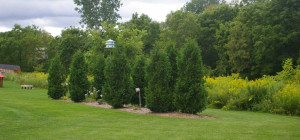Taking proper care of your lawn doesn’t mean just watering it. Cutting grass, killing weeds, fertilizing, etc. are all essential if you want to have a healthy lawn. However, even if you do all of the above, there is still a chance your lawn might wither away.
This is because people often overdo things when it comes to gardening. Watering too much and treating your lawn with a lot of pesticides are the most common mistakes people make. Going overboard is not just bad for your lawn, but also for the environment.
If you want to learn how to take proper care of your lawn without wasting resources, then you have come to the right place. Our goal is to show you the best ways of going about gardening, as well as to highlight some positive effects that will come from doing them. Enjoy.
Positive effects of proper lawn management

One might think that every patch of green, even your backyard lawn, is good for the environment. Well, it is, and it isn’t. Sure, even the smallest patch of grass is better for the environment than a concrete slab. However, once you start showering that patch of grass with pesticides in order to kill weeds, you can potentially create a counter effect.
Nature tends to balance itself out, but once we humans start messing with it, there is a chance of hurting that balance. Trimming your lawn creates waste. Treating your plants with pesticides will kill weeds, but it can also hurt plants in the surrounding area. Over watering your lawn is not only a waste of resource, but it will actually do more bad than good to your lawn.
As you can see, there are a lot of mistakes you can make by not educating yourself in proper lawn management. But that’s why we are here. If you follow the tips in this article, you can affect the environment in a positive way.
For example, switching to an electric mower from a gas-powered one will reduce the amount of air pollution your household produces. If you rake and mown your grass less often, you will produce less waste. People think that plastic is the only harmful thing for the environment, but trimmings from your grass can pollute as well. Lastly, by letting nature do the watering you will reduce your household’s water consumption. This is especially important if you live in an area that is prone to droughts.
Best ways to go about it

Now that you know what positive and negative effects your lawn can have on the environment, let’s learn how to avoid the negative ones and create only on the positive ones.
First, don’t water your lawn until you see signs of drought. Grass is a tough little plant, and there is no need to water it on a daily basis. In fact, over watering can drown the roots of your grass, causing it to die out. Ideally, rainfall should be enough to do the watering, but if you see signs of a drought, you can turn on your sprinklers to freshen it up a little bit.
Second, when cutting your grass, make sure you properly dispose of the waste. Some people are negligent when it comes to waste disposal. Leaving your grass trimmings on the sidewalk can actually do a lot of damage. The wind can pick them up and pollute local water sources. The best way to go about this is to leave the trimmings on the grass. Once they decompose, they will serve as a fertilizer, feeding the soil and keeping your grass healthy.

Ultimately, if all this sounds a bit too much for you or you have more than just a small lawn, with plants and flowers that all require different treatment, there is always the option to hire some professional help. For example, Manna Landscapes is a gardening company that will design your garden and maintain it as well.
That is about it. Gardening should be a fun little hobby that you tend to from time to time. However, that doesn’t mean that there is not a bad and a good way to go about it. We hope that today you’ve learned the latter one. Just remember to ease up on the pesticides and watering and to properly dispose of the waste, and your lawn will be as eco-friendly as it gets.







